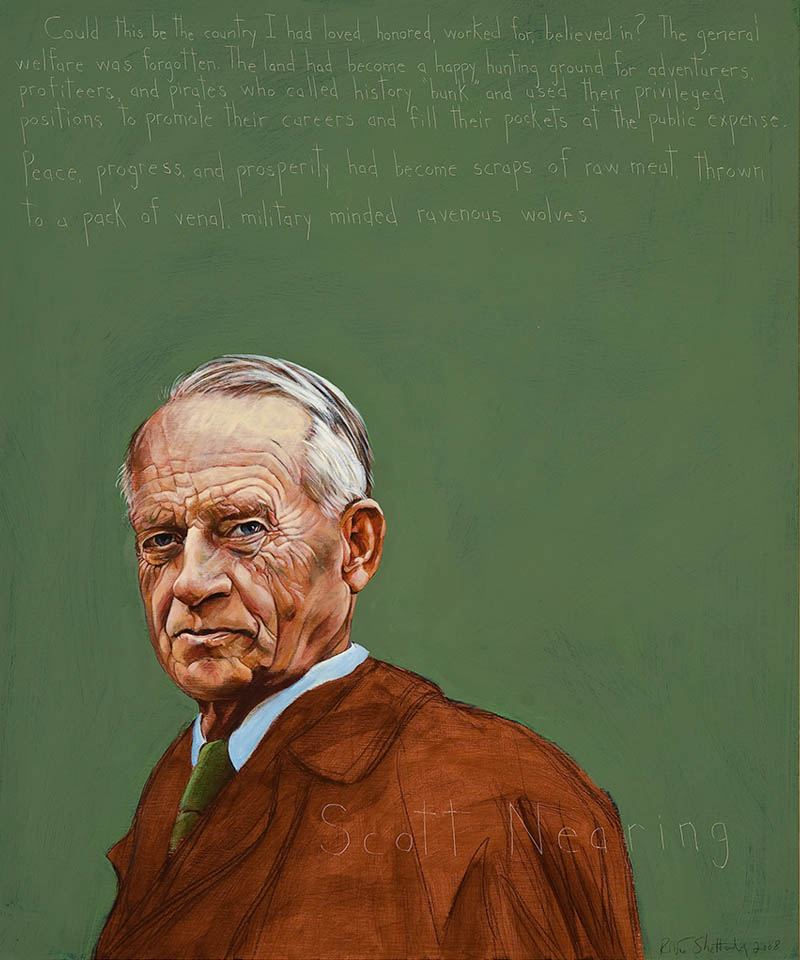
Scott Nearing
Economist, Author, Organic Farmer : 1883 - 1983
“Could this be the country I had loved, honored, worked for, believed in? The general welfare was forgotten. The land had become a happy hunting ground for adventurers, profiteers, and pirates who called history bunk and used their privileged positions to promote their careers and fill their pockets at the public expense. Peace, progress, and prosperity had become scraps of raw meat, thrown to a pack of venal, military minded ravenous wolves.”
Biography
Scott Nearing, widely known for the book he wrote with his wife Helen, Living the Good Life: How to Live Simply and Sanely in a Troubled World, might not have thought that with his privileged upbringing he would end up “living off the land.” His ideas, radical when he first taught them, are still part of the American debate about what qualifies as “the good life.”
Nearing was born and raised in Pennsylvania. Thanks to the success of his grandfather and his parents, he grew up in a large house with a tutor and servants and surrounded by books and art to feed his intellectual curiosity. Rather than follow his father and grandfather into business, he developed a new philosophy of social awareness different from his family´s values. Nearing began writing and speaking against capitalism and the acquisition of money and “things” as the route to happiness.
After leaving law school, Nearing went to the University of Pennsylvania´s Wharton School of Business. He received a PhD in 1909 and eventually began teaching economics and sociology.
Nearing´s criticisims of American capitalism targeted “the philosophy of life which has gripped a part of the American population—the philosophy: ‘Be rich and you will be happy.’” In his 1913 book Social Sanity: A Preface to the Book of Social Progress, he writes, “If wants are limitless, and increasing faster than income, which is limited, and if the difference between wants and income measures the extent of dissatisfaction, or misery, then, so long as men seek their satisfaction in material things, relying upon goods for happiness, they are pursuing a will-o’-the-wisp which flies from them faster than they can ever pursue.”
This view of an America becoming increasingly unhappy as it values making money and acquiring goods rather than finding happiness in other aspects of life made Nearing popular as a social activist. His views also got him dismissed from his position as a professor at Wharton.
Undaunted, Nearing began speaking against World War I and became a member of the Socialist Party. He also began lecturing at the Rand School of Social Science. Here, his writings became even more sharply pointed and critical of what America had become. In The American Empire,he wrote, “Steam, transportation, industrial development, city life, business organization, expansion across the continent—these are the factors that have made of the United States a nation utterly apart from the nation of which those who signed the Declaration of Independence and fought the Revolution dreamed….These economic changes have brought political changes. The American Republic has been thrust aside. Above its remains towers a mighty imperial structure—the world of business—bulwarked by usage and convention; safeguarded by legislation, judicial interpretation, and the whole power of organized society. That structure is the American Empire—as real to-day as the Roman Empire in the days of Julius Caesar…”
In the 1930s, Nearing and his second wife, Helen, bought property in Vermont to begin a new life of living off the land. In 1954, Living the Good Life was published. The Nearings traveled, wrote, and continued to spread their anti-war, pro-peace message, all the while devoted to their “old-fashioned” homesteading way of living. Eventually they moved their life to Maine. In the mid-1960s, during the tumultuous years of the Vietnam War and the Civil Rights Movement, Scott Nearing’s anti-war message and his and Helen’s sustainable lifestyle inspired a younger generation´s “back-to-the-land”.
Scott Nearing continued his writing and his work on the land into his nineties. He died after turning one hundred in 1983. He left behind an extensive body of work and the idea that a life lived simply can lead to satisfaction.
Programs
Americans Who Tell the Truth (AWTT) offers a variety of ways to engage with its portraits and portrait subjects. Host an exhibit, use our free lesson plans and educational programs, or engage with a member of the AWTT team or portrait subjects.

Education
AWTT has educational materials and lesson plans that ask students to grapple with truth, justice, and freedom.

Exhibits & Community Engagement
AWTT encourages community engagement programs and exhibits accompanied by public events that stimulate dialogue around citizenship, education, and activism.